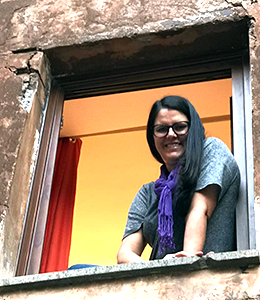Released 10-21-21
Submitted by Cisco Systems, Inc.
People behind CSR at Cisco: Early-stage tech entrepreneurs benefit from Cisco’s Global Problem Solver Challenge
Robots plucking trash from oceans and inexpensive bionic limbs; These are just two winning concepts from the Cisco Global Problem Solver Challenge, which announced its newest winners in June. The competition shows that as digital technology advances, so does the range of creative ideas that they use in amazing ways to tackle ubiquitous social and environmental problems around the world. The winners will receive cash prizes to take their solutions to the next level; This year, 20 social entrepreneur teams received a total of $ 1 million in the initial phase.
Nobody knows the competition better than Shawna Darling, a CSR program development manager at Cisco Corporate Affairs who has led the program since it began in 2016. Under her enthusiastic and dedicated leadership, the annual Cisco Global Problem Solver Challenge has matured and grown to date, awarding $ 2.25 million to 63 technology startups from 20 different countries. She also manages and helps develop Global Problem Solvers: The Series, an animated program designed to inspire middle school students to pursue STEM and entrepreneurship, and works with Global Citizen to contribute to the Global Citizen Prize: Cisco Youth Leadership Award forgive.
Though she once dreamed of becoming an archaeologist, Shawna received a bachelor’s degree in educational technology before joining Cisco in 1999 and the Corporate Affairs team in 2007 Challenge is a major social impact program as part of Corporate Social Responsibility (CSR) – Efforts by Cisco.
You wore different hats before working on CSR programs; Can you tell us more about it and what made you stand up for social entrepreneurs?
Shawna: When I came to Cisco, I was still living in Canada, which is where I come from. I developed training materials for our sales reps and I flew to San Jose once a week. I eventually moved to San Jose and worked in a variety of education and leadership development roles for several years, but with my background in education and technical training, I always thought I should work in Cisco’s CSR division.
The opportunity to move to CSR came after Hurricane Katrina in August 2005 over the US Gulf Coast. Cisco invested $ 40 million in school systems in Louisiana and Mississippi to rebuild the infrastructure with technology and train teachers to use it, a great fit with my technology-oriented educational background. I took the chance to move my family to New Orleans as part of this 21st Century Schools initiative and lived there for a year. We made necessary systemic changes in school districts that had many challenges before the hurricane. When this program ended, I returned to California and joined the CSR team to work on other initiatives.
The Cisco Global Problem Solver Challenge just celebrated its fifth anniversary and is now one of Cisco’s premier CSR programs. How has it developed since its inception?
Shawna: We have expanded. For the past five years, the number of applications from startups has doubled each year, except in 2021, when the number more than tripled. That was a happy surprise!
We also wanted to attract a wider and more diverse range of competitors. In 2020, we lifted the requirement that entrepreneurs be university students or graduates for several reasons: We saw the value in involving senior social entrepreneurs in the early stages who have great ideas and experience. We also realized that some innovators are taking an alternate path and bypassing the university as a whole, especially in the global community.
Another significant development was the types of problems being addressed. With the global spread of climate and environmental crises in recent years, more and more start-ups are addressing these problems. This is very important to Cisco as we recently made a commitment to net zero by 2040.
What hasn’t changed is our focus on empowering tech entrepreneurs who can really take advantage of funding in the early stages.
How has the Cisco Global Problem Solver Challenge helped improve the playing field for female social entrepreneurs?
Shawna: Female founders often only get a fraction of the funding that male entrepreneurs get. Innovation challenges like ours are a means of giving women start-ups a fair chance. We fully support social entrepreneurs, especially since studies show that women entrepreneurs are often more successful in the long term and achieve more than double the return on investment.
Every year we reach out to organizations that support women entrepreneurs to ensure that the majority of applicants have at least one co-founder. Since we started, around 25 percent of the participants have been women, and in 2021 there was at least one female founder in nine of the 20 winning social entrepreneur teams. But of course we would like to see more.
Can you share a success story from one of the contestants where victory made a difference?
Shawna: I could speak of several participants, but OmniVis comes to mind. As second runner-up in 2017, they developed a smartphone-based tool for testing for cholera in water. Since winning the prize money, they have been able to expand their product line to include tests for the COVID-19 pathogen in human saliva and increase their workforce to six full-time employees. Additionally, the Cisco name associated with the award resulted in increased visibility and additional awards, as Katherine Clayton, CEO and Co-Founder of OmniVis, confirmed when she said, “It has helped us gain more recognition and move us further into our markets push. “
Can you tell us more about the role the Cisco Global Problem Solver Challenge plays in Cisco’s mission to advance an inclusive future for all?
Shawna: By investing in early stage entrepreneurships without investing in the companies, we’re helping them move forward. In particular, these start-ups are future job creators who secure their livelihoods for others while solving social and ecological problems at the same time.
What social issues do you think the winners of the Cisco Global Problem Solver Challenge will envision over the next five years or so?
Shawna: We’re going to see more innovators addressing the roots of the climate problem. I also see tremendous opportunities in smart farming. Agriculture in the world is not very technology-oriented, but there is so much potential to help smallholders get better harvests and higher profits. Most of all, however, what appeals to me are the social entrepreneurs with innovations for topics that we haven’t even thought of yet. The competition will help them gain more visibility.
Can you share something personal about yourself that others would like to know?
Shawna: Well, I have a cute pandemic puppy. My son named him Fenrir – Fen for short – after a Nordic wolf god. Fen is a Pomsky – half Pomeranian and half Husky – who is now five months old. It’s a bit like taking care of a newborn baby!





/cloudfront-us-east-1.images.arcpublishing.com/gray/7T5JK6OGW5FLHBWUPPRDKMTNAI.jpg)